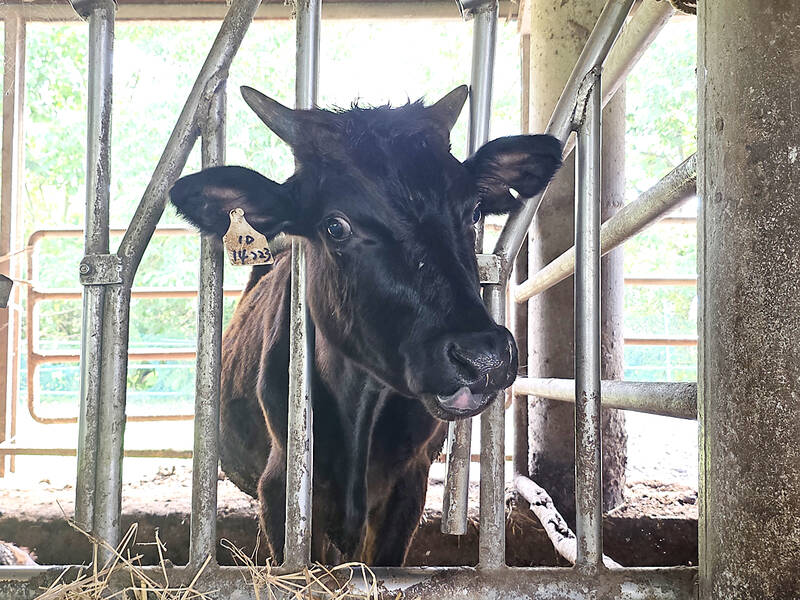Taiwan’s first privately bred cattle breed, the Yuansing (源興) cattle, was launched in Hualien on Tuesday with a three-year, 1,000-head breeding plan aimed at making premium beef affordable to the public.
The breed originated from 19 head of cattle purchased by the Lee Teng-hui Foundation in 2016.
The cattle were moved to Shin Kong Chao Feng Ranch and Resort (新光兆豐農場) in Hualien County’s Fonglin Township (鳳林) eight years ago, and GGP Biotechnology Co was established to breed it and promote it in the beef market.

Photo: Hua Meng-ching, Taipei Times
The Ministry of Agriculture approved the breed’s official registration in June last year.
GGP Biotechnology chair Liu Tai-ying (劉泰英) announced the plan to breed 1,000 Yuansing cattle over three years in collaboration with the National Animal Industry Foundation (NAIF) and Yunlin County’s Yunchang (芸彰牧場) and Farm Around You (農場晃晃牧場) ranches.
The goal is to make high-quality, domestically processed beef accessible and affordable to everyone, Liu said.
GGP Biotechnology general manager Chung Ti-ming (鍾迪名) said the average per capita beef consumption in Taiwan was 7.8kg in 2023, with total annual consumption reaching 180,000 tonnes.
Only 4.6 percent of that was produced locally, which means Taiwan relies heavily on imported beef to meet demand, Chung said.
The domestic beef market relies on the dairy industry, with 90 percent of beef coming from Holstein dairy cows and the remaining 10 percent from water buffalo or yellow cattle, he said.
As Taiwan lacks a stable, dedicated beef cattle breed, Yuansing holds strong market potential, he added.
Yuansing beef is delicious, with a noticeably sweet flavor due to higher blood sugar levels, differing from the melt-in-your-mouth texture of Japanese Wagyu, Chung said.
The goal is to raise 1,000 purebred Yuansing cattle in collaboration with Yunchang and Farm Around You ranches, both of which have good animal welfare and health management standards, he said.
Once matured, the cattle would be brought back to GGP Biotechnology for processing and distributed through restaurant chains, he said.
Pricing would be similar to US beef, with hopes of driving rural transformation, encouraging young people to return to farming and expanding into international markets, he added.
Yuansing cattle are descendants of the Tajima lineage from Hyogo, Japan, which were brought to Taiwan in the 1930s during the Japanese colonial period.
Former president Lee Teng-hui (李登輝) purchased the remaining 19 of these cattle in 2016, and named them Yuansing, after his old family house Yuansing (源興居) in New Taipei City’s Sanjhih District (三芝).
After being raised on the Shin Kong Chao Feng Ranch and Resort for eight years, there are now more than 200 head of cattle, Credere Media reported yesterday.
The ranch raises the cattle on a dedicated 6 hectare area and plays symphonic music “to help the cattle relax, so aggressive bulls won’t fight,” Chung said, according to the report.
Liu said the biggest challenge in developing Yuansing cattle is the limited number of animals, as it is only possible to meet market demand with a population of at least 1,000.
NAIF chair Su Chih-fen (蘇治芬) said that GGP Biotechnology has 15,000 doses of Yuansing bull semen, which can be used to create a uniquely Taiwanese beef brand and strengthen the nation’s cattle industry.
Additional reporting by Yang Yuan-ting

The Executive Yuan yesterday announced that registration for a one-time universal NT$10,000 cash handout to help people in Taiwan survive US tariffs and inflation would start on Nov. 5, with payouts available as early as Nov. 12. Who is eligible for the handout? Registered Taiwanese nationals are eligible, including those born in Taiwan before April 30 next year with a birth certificate. Non-registered nationals with residence permits, foreign permanent residents and foreign spouses of Taiwanese citizens with residence permits also qualify for the handouts. For people who meet the eligibility requirements, but passed away between yesterday and April 30 next year, surviving family members

The German city of Hamburg on Oct. 14 named a bridge “Kaohsiung-Brucke” after the Taiwanese city of Kaohsiung. The footbridge, formerly known as F566, is to the east of the Speicherstadt, the world’s largest warehouse district, and connects the Dar-es-Salaam-Platz to the Brooktorpromenade near the Port of Hamburg on the Elbe River. Timo Fischer, a Free Democratic Party member of the Hamburg-Mitte District Assembly, in May last year proposed the name change with support from members of the Social Democratic Party and the Christian Democratic Union. Kaohsiung and Hamburg in 1999 inked a sister city agreement, but despite more than a quarter-century of

Taiwanese officials are courting podcasters and influencers aligned with US President Donald Trump as they grow more worried the US leader could undermine Taiwanese interests in talks with China, people familiar with the matter said. Trump has said Taiwan would likely be on the agenda when he is expected to meet Chinese President Xi Jinping (習近平) next week in a bid to resolve persistent trade tensions. China has asked the White House to officially declare it “opposes” Taiwanese independence, Bloomberg reported last month, a concession that would mark a major diplomatic win for Beijing. President William Lai (賴清德) and his top officials

The Ministry of Foreign Affairs (MOFA) yesterday expressed “grave concerns” after Singaporean Prime Minister Lawrence Wong (黃循財) reiterated the city-state’s opposition to “Taiwanese independence” during a meeting with Chinese Premier Li Qiang (李強). In Singapore on Saturday, Wong and Li discussed cross-strait developments, the Singaporean Ministry of Foreign Affairs said in a statement. “Prime Minister Wong reiterated that Singapore has a clear and consistent ‘one China’ policy and is opposed to Taiwan independence,” it said. MOFA responded that it is an objective fact and a common understanding shared by many that the Republic of China (ROC) is an independent, sovereign nation, with world-leading